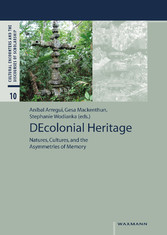Suchen und Finden
Service
Book Cover
1
Imprint
4
Contents
5
DEcolonial Heritage. Natures, Cultures, and the Asymmetries of Memory. Introduction (Aníbal Arregui, Gesa Mackenthun,Stephanie Wodianka)
7
Heritage in the Age of Geographical and Cultural Mobility
10
Heritage Time and the Coloniality of Heritage
14
Decolonizing Heritage
17
Chapter Summaries
20
Works Cited
27
Chapter One. Stewarding Disputed Heritage: Private Property, Tribal Legacy, National Patrimony, Global Commons (David Lowenthal)
31
Heritage Stewardship is Innately Possessive
32
Stewardship is Traditionally Parochial
33
Biblical Origins of Heritage
35
“My Country, Right or Wrong”
36
Universalizing Heritage: the Modern Mission
37
Universalizing Heritage: the Sober Reality
38
Repatriation Dilemmas and Nationalist Priorities
39
Conflicting Values: Nations, Tribes, and UNESCO
41
From Cosmopolitanism to Cultural Apartheid
46
Stewarding Universal Natural Heritage
47
Small Island Heritage Havens
48
Works Cited
50
Chapter Two. How Did Climate Change Cause the Collapse of Civilizations in the Historical Past? (Ronnie Ellenblum)
55
The Length and Strength of an Affective Crisis
57
How Does a Crisis Develop? From Climate Anomaly to Social Crisis
59
Could the Administration Prevent the Scarcity?
61
The Social Consequences of Climate Crises
64
Climate Crises, Refugees, and Nomadic Migrations
66
The Limits of the Crisis
69
The End of the Crisis
70
Conclusion
71
Works Cited
72
Chapter Three. Bad Heritage: The American Viking Fantasy, from the Nineteenth Century to Now (Karl Steel)
75
Race and the Modern Viking
76
The Heterogeneous Medieval Norse
83
Against the White Fantasy
86
Works Cited
90
Chapter Four. Du “Patrimoine national” au “Patrimoine interculturel”: Concepts et formes d’institutionnalisation, depuis la Révolution Française jusqu’au Musée National d’Histoire de l’Immigration (Hans-Jürgen Lüsebrink)
97
Réflexions préliminaires, concepts, périodisations
97
Henri-Baptiste Grégoire – Idéologue national et homme politiqueré publicain dans le contexte de la Révolution Française
100
Horizons transnationaux et formes de mémoire interculturelle
107
OEuvres Citées
112
Chapter Five. Le patrimoine en question(s): Le moment des années 1830 au prisme des “Voyages en France” de Stendhal (Laure Lévêque)
115
Chapter Six. From Town to Cultural Site: The Heritagization Paths for Casablanca (Romeo Carabelli)
135
Imperial Development During the Protectorate
135
The Birth of a Cultural Heritage Issue
137
The “Civil Society” Came into Action
138
The International Path as an Incentive for Local Action
142
An Inescapable Corollary
143
The Preparation and Management of the Casablanca’s Candidature Dossier
145
Lessons from Casablanca
146
Works Cited
147
Chapter Seven. The Gift of Heritage: Making “Eco” Economical in Nigeria (Peter Probst)
151
Preserving the Home of the Goddess
154
From Vertical to Horizontal Politics
159
Exchange as Mediation
163
Property Issues
166
Conclusion
171
Works Cited
172
Chapter Eight. Indigenous Knowledges, Ecology, and Living Heritage in North America (Kerstin Knopf)
175
Introduction
176
The Documentary Film
179
Indigenous Knowledge in Western Environments
184
Indigenous and Western Concepts of Ecology
188
Indigenous Knowledges as Living Heritages
191
Works Cited
198
Chapter Nine. Ecological Conservation vs. Big Oil: The Case of Yasuní in Ecuador (Jürgen Vogt)
203
UNESCO Biosphere Reserve
203
Ecuador
204
Economic and Political Surroundings
205
The Constitution and the Concept of a Good Living
206
Yasuní National Park and the Yasuní Biosphere Reserve
207
The Ishpingo-Tambococha-Tiputini Initiative
209
The Failure of the ITT Initiative
210
China’s Impact on the Yasuní
211
Protest Against Oil Drilling from Inside and Outside the ITT
212
The Falling Oil Price – a New Chance for the ITT?
213
Green Light for Oil Drilling Inside the Yasuní
213
Conclusion
215
Works Cited
216
Chapter Ten. Naturalizing Culture in the Pyrenees: Heritage Processes and the Eternalization of Rural Societies (Camila del Mármol and Ferran Estrada)
219
Introduction
219
Heritage in the Catalan Pyrenees
220
Naturalizing Culture
222
Authenticity, Past and Nature
224
Approaching Culture to Nature in Rural Contexts
226
Architecture
228
Productes de la Terra
231
Conclusions
232
Works Cited
233
Chapter Eleven. Panarchy and the Cross-Cultural Dynamics of Place in Nineteenth-Century America (John J. Kucich)
237
Place, Materiality, and Ecocultural Contact
240
Talking Trees: Jane Johnston Schoolcraft and Margaret Fuller
243
Spirits of the Woods: Henry Thoreau and Joseph Nicolar
249
Panarchy and Ecocultural Contact
253
Works Cited
255
Chapter Twelve. Cultivating the Sky (Aníbal Arregui)
257
Inheriting an Atmosphere
259
Forest-Sky Relation as Tensional Space
260
Forest-Sky Relation in an Irreversible Time
261
Cultivating (in) the Chaos
263
Climatology and Animism
264
Environmental Diplomacy
266
Decolonial Connections
268
World Heritage at the End of the World
270
Works Cited
272
Contributors
275
Alle Preise verstehen sich inklusive der gesetzlichen MwSt.








